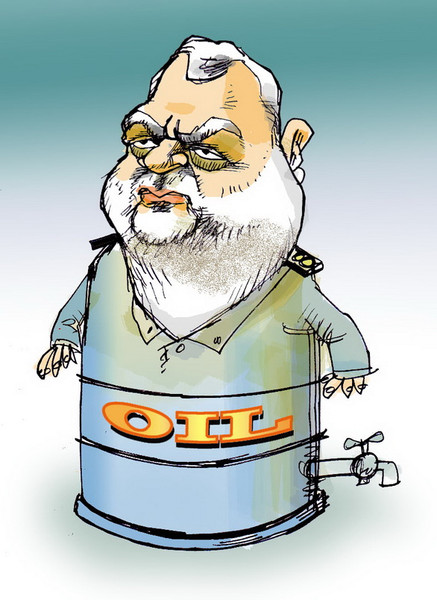See also The Latest from Iran (23 December): Ahmadinejad on Economy "Everyone is Wrong Except Me"
 Minister of Oil Rustam Qassemi1750 GMT: Currency Watch. Without providing sources, Radio Zamaneh claims that the Iranian Rial has slipped to 33500:1 vs. the US dollar, its lowest point since Central Bank and Government intervention in October.
Minister of Oil Rustam Qassemi1750 GMT: Currency Watch. Without providing sources, Radio Zamaneh claims that the Iranian Rial has slipped to 33500:1 vs. the US dollar, its lowest point since Central Bank and Government intervention in October.
The Rial had lost 70% of its value this year before the intervention --- suspension of the open market and a special "trade room" backed by injection of foreign reserves --- bolstered it, according to some reports as strong as 27000:1. However, EA sources in Iran have been reporting that the Rial began sliding again this month, reaching about 31000:1 last week.
1600 GMT: A Death in Detention. Tehran Prosecutor Abbas Jafari Doulatabadi has edged towards an admission --- after more than seven weeks of denials --- that blogger Sattar Beheshti died from abuse during interrogation in Evin Prison on 3 November.
Doulatabadi said today, “The most probable cause of the jailed blogger Sattar Beheshti’s death, is a blow, or blows together with mental stress.”
The prosecutor said the case was examined by “a commission of 11 pathologists and other physicians and they more or less confirmed this statement".
In another revision of the previous line from authorities, Abbas Jafari Dowlatabadi said the commission found that “Sattar Beheshti did not have heart problems".
Within days of the blogger's death, officials said he had likely succumbed to a heart condition. Beheshti's family responded that he had been in good health when he was seized by cyber-police on 30 October.
The report of the commission will reportedly be read in Parliament on Wednesday.
1530 GMT: All the President's Men. Senior Presidential aide Ali Akbar Javanfekr has returned to prison after a four-day medical furlough.
President Ahmadinejad visited Javanfekr, serving a six-month sentence for "publishing material contrary to Islamic norms" and insulting the Supreme Leader, in hospital on Sunday.
1520 GMT: Energy Watch. In a potentially major blow to Iran's energy sector, the China National Petroleum Corporation appears to be pulling out of a $5 billion contract to develop Phase 11 of the giant South Pars gas field.
Ministry Spokesman Alireza Nikzad-Rahbar warned last week that the long-delayed contract could be terminated, “Given the [lack of] inclination on the part of the Chinese, the contract for Phase 11 is likely to be called off."
CNPC was commissioned in 2009 to develop Phase 11, after France’s Total and Malaysia’s Petronas pulled out. In the last three years, Russian firms, Spain's Repsol, and Royal Dutch Shell have also withdrawn from South Pars projects.
1200 GMT: Foreign Affairs Watch (Syrian Front). Iranian officials continue --- to no obvious effect --- to press the line of a Tehran-led effort of a resolution of the Syrian crisis.
Alaeedin Boroujerdi, the chairman of Parliament's National Security Committee, declared on Sunday, “Dialogue and political negotiations between friendly and opposition groups inside Syria is the only way to resolve the crisis in this country."
MP Hossein Naqavi said, "Beijing and Moscow agree with Iran’s plan” for a political settlement.
Iran put out an initiative in September for an agreement between the Assad regime and the "opposition" inside Syria, and Tehran re-packaged and re-presented this as a six-point plan last week. The efforts, despite Naqavi's claims, have scarcely been mentioned outside Iran.
1110 GMT: Economy Watch. Former Minister of Industry Eshaq Jahangiri has claimed that the "real" rate of inflation is 40 to 50%.
0710 GMT: All-Is-Well Alert (cont.). Minister of Industry Mehdi Ghazanfari declared on Sunday, “Sanctions have caused an economic advantage for the production sector, and we should use this opportunity in the best way."
There is no indication in the summary of Ghazanfari's remarks how Iran --- amid falling production, rising prices, and difficulties over imports and currency --- has found "economic advantage" in sanctions.
0640 GMT: Speaking on Sunday, Minister of Oil Rustam Qassemi put out another of his all-is-well declarations over the state of Iran's production and exports.
On this occasion, however, there was a difference. For the first time, Qassemi admitted that not all was well earlier this year: “Following the imposition of these sanctions, we were in bad condition for two months, [but] we’ve managed to weather that dire strait and…today we can export crude oil [again].”
Qassemi was referring to the wave of sanctions this summer, notably the European Union's ban on 1 July on imports from the Islamic Republic and restrictions on Iranian shipping: “No vessel was authorised to sail towards Iran....Moreover, crude oil tankers were denied insurance coverage at that time.”
Since July, Tehran has claimed that it has reached alternate insurance arrangements, including the provision of Iranian coverage and "sovereign" insurance by countries like Japan.
Although no numbers are given in the Press TV report, Qassemi was likely referring to a rebound in October's export figures. Iran --- which shipped 2.2 million barrels per day in 2011 --- recovered to 1.3 million after falling as low as 860,000 during the summer.
The Minister almost certainly did not refer to evidence that the recovery is likely to be short-lived, the outcome of a "bubble" of filled contracts, or industry projections that Tehran will hit a historic low in December with exports of only 824,000 barrels per day.